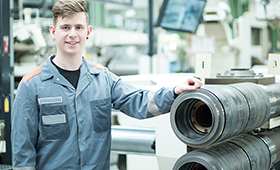A hot job - process technologist in the metal industry
Updated training regulation enters into force on 1 August
37/2018 | Bonn, 16.07.2018

The production and reforming of steel, copper, aluminium, lead and gold have always been procedures involving plenty of heat. Although this is still very much the case, operational work and business processes have changed. There is now a focus on ensuring that training takes account of technological developments and of new requirements relating to digitalisation. Working on behalf of the Federal Government and acting in conjunction with the federal ministries responsible, the social partners and experts from the field of company practice, the Federal Institute for Vocational Education and Training (BIBB) has therefore modernised the existing training in the occupation of process mechanic in the metallurgical and semi-finished goods industry and introduced a new title of process technologist in the metal industry. The new training regulation enters into force on 1 August 2018.
The tasks of process technologists in the metal industry are to monitor, control and regulate production processes and to streamline the various procedures deployed. This includes the identification and rectification of malfunctions and the instigation of quality assurance measures within the process sequences.
The updated three and a half-year vocational education and training programme will offer four different specialisms in future. These are iron and steel metallurgy, steel forming, non-ferrous metallurgy and forming of non-ferrous metals. Alongside the needs of Industry 4.0, crucial topics which have been influential in helping bring about modernisation include guidance systems, process monitoring systems and integrated management systems. New training contents such as customer orientation, English language skills, team work and lifelong learning have also been added. The previous traditional structure consisting of an intermediate and final examination will be replaced by an extended final examination.
Work venues for process technologists in the metal industry are coking plants, sinter plants, blast furnaces, steelworks, melting shops and foundries, rolling mills, pressing plants, forges, metal extrusion works, smelting companies, electrolysis plants and flash smelting facilities for the production of lead, aluminium and copper.
In 2016, a total of more than 1,800 persons were undergoing training in the occupation of process mechanic in the metallurgical and semi-finished goods industry. 525 new training contracts were concluded in 2017. The average monthly training allowance is around €1,000.
Trainees enjoy good prospects of being offered permanent employment by the companies. Following completion of training, it is possible to pursue continuing training leading to subsequent qualification as a state-certified technician in relevant specialisms.
The updated training regulation and the aligned skeleton curriculum, which has been developed by the Standing Conference of the Ministers of Education and Cultural Affairs (KMK) for the school-based section of the dual vocational education and training, replaces the existing regulations from 1997 as of 1 August 2018.
Image material is available www.bibb.de/pressefotos.
Point of contact: Axel Kaufmann; email: kaufmann@bibb.de
Specimen copy requested if printed.